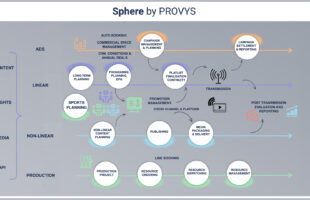There’s no doubt 2011 has been a signifi cant one for TV business globally and in Asia. Localization is almost commonplace across various genres; content creation and co-productions are on the up; new PayTV channels are adding to the mix and various technologies are being launched to tackle the insatiable need for varied and different content on multiple platforms.
The highs
I began by asking our panel of executives, “What trends in viewership are they seeing for their respective channels in different markets across the region?”
“Overall it’s very encouraging,” shared Louis Boswell, GM AETN All Asia Networks. “We’re still – compared to some of the other factual channels – relatively new, but with viewers we have already caught up ground.”
Boswell went on to say that the company’s clear mandate for localization has given it the edge. “From day one we wanted to make sure we were telling stories that were relevant from the perspective of people in Malaysia, or the Philippines, for instance. I think that we’ve delivered on this and it’s continuing to pay dividends.
He noted that the Manila Hostage Massacre on History and Bio’s special on Tony Fernandes, CEO of Air Asia, performed very well in Singapore, for example. “We make sure all our shows have credibility and are accessible for audiences across the region. It’s great to see this content spilling out into other markets.”
Joon Hee Lee, SVP Content and Communications, Fox International Channels, said there’s no doubt PayTV has grown markedly this year, “The trend we are seeing is that viewers want to watch content that is relevant to them, which is why our strategy in the region has always been one of localization – we don’t have a one-size-fi ts-all approach. We offer completely local programming, scheduling, marketing and sales operations.”
Going by numbers, Asia was in the mood for matrimony this year. Kevin Dickie SVP Content Group, Discovery Networks Asia-Pacifi c said its Royal Wedding Week in late April was one of the broadcaster’s biggest hits this year.
“Despite the wide coverage across all networks, our wedding specials, which included for the fi rst time a LIVE feed from the actual event in London, brought in huge numbers for TLC,” said Dickie.
Dickie added that the highest viewership that week was India, up a whopping 823 per cent, followed by Malaysia, up 675 per cent, based on average ratings from cable TV viewers aged 25 – 54 years.
Wedding bells rang for women’s lifestyle channel WEtv also. Said Harold Gronenthal, SVP and GM, AMC/Sundance Channel Global, “Wedding programming was remarkably well received throughout our Asian territories. My Fair Wedding with David Tutera as well as our Bridezillas franchise are both strong fan favourites. It seems that all things wedding is an extremely resonant topic in Asia.”
Amit Malhotra, VP Disney Media Distribution Asia-Pacifi c, added, “Content that resonates with family has been pulling in big ratings, which is not surprising in a region that places tremendous priority on family values.”
Kazumasa Iida, NHK’s Head of International Program Development said ethical programming rated with Japanese. “A big surprise for us was Justice, Harvard University’s popular lectures on moral dilemmas by Professor Michael Sandel. We acquired the series from PBS International, and it quickly became one of the most-watched offerings on our online catch-up service. Justice has become a buzzword and ancillary products sold immensely.”
Specialized genre channels have also seen marked increases in ratings.
Commenting on Japanese animation channel Animax, Ricky Ow, SVP and GM Networks, Asia, Sony Pictures Television, said, “The anime titles, which have an existing strong following for the manga (comics) series and/or games that some of the shows are based on, are drawing viewers almost irrespective of the timeslots these programmes are scheduled in. In that respect, we continue to enjoy the greatest success with franchises that are very popular and prominent in the market.
“K-On!, a slice-of-life comedy anime franchise about four teenage girls, has done very well across Asia on Animax. And teenage boystargeted action series Fairy Tail and supernatural themed Nura: Rise of the Yokai Clan have also been successful regionally. Fantasy anime 07-Ghost was particularly well received in Hong Kong and Taiwan.”
Manu Sawhney, ESPN Star Sports’ MD, shared that the ICC Cricket World Cup, held in February, was the biggest sporting event in the history of Star Sports here. “We had a reach of more than 204 million viewers, 90 per cent of a total measured C&S audience in India. We backed up the LIVE content with original programming created around it. The fi nal match achieved a record rating of 27.2 per cent, peaking at 41.2 per cent during the game.
“With increased exposure and awareness, there is increased engagement and we are seeing emergence of multi-sport fans who are consuming multiple sports.”
Seeing the fl urry of business going on in Asia, BBC World News has expanded its operations here to strengthen its localized coverage. “This year we’ve made our biggest editorial investment in a specifi c region, which demonstrates our commitment to both building our business and editorial output across Asia,” said Colin Lawrence, Commercial Director for BBC World News.
“We launched Newsday, our morning news programme from Singapore and London in June – initial feedback is extremely positive.”
The lows
“It hasn’t been all plain sailing though. What challenges – be it continuing, or new, have dented your efforts this year?”
Ow pointed out that censorship across different markets continues to be a headache. “Animax is watched by a very broad viewer base that ranges from tweens to working adults. With that in mind, age-group appropriate and relevant programming is a perpetual challenge. Every market has different censorship standards, it can be very easy to over-censor. That adversely affects the integrity of programmes and conversely, viewers’ enjoyment of our shows.”
“Changing regulations, which more often than not are done without any prior notifi cation, is also a continuing problem,” said Sawhney. “Lack of proper tariff regimes have led to a lot of uncertainty amongst everyone.”
He noted that the cost of content has also infl ated, “Any emerging market or economy brings with it a growth phase with entry of new players, thus leading to proliferation and fi nally infl ation. Infl ationary pressure along with incorrect estimation of market potential is raising the price beyond commercially viable levels.”
The perennial bugbear of illegal downloading also remains. And stalling the pirates comes at a price, said Ow. “In response to this long term challenge, Animax has invested in offering selected shows in simulcasts with Japan, and will be offering its fi fth such title, Last Exile – Fam, The Silver Wing, in the same day as Japan, from this month.”
“Our greatest challenge will continue to remain the dominance of local content,” said Malhotra. “We’re constantly looking for ways to work with partners to localize our content to resonate with their audiences. The success of The Amazing Race in China with SMG and CCTV and in Australia with Channel 7 is a great example of that partnership.”
Disaster also brought about fresh challenges in content creation said Iida, “Within two minutes after the earthquake on March 11, NHK suspended all channels and switched to 24-hour non-stop news coverage. Within a week of the quake, as many as 600 NHK directors and producers throughout the country had been pulled from their regular work and sent to the disaster area to help with the news coverage.
“Ever since, NHK has continued to create documentary specials almost every other week,” said Iida, adding this MIPCOM will be the fi rst time NHK will be collectively releasing so many of the documentaries on the event internationally.
Fragmentation and the development of multiplatform technologies – while not affecting traditional business lines – was also hot on the execs lips.
Shared Sawhney, “What we are seeing today across the globe is not a revolution but an evolution. Consumers today, being more enabled by the technology, are looking for content across platforms in new ways. It is the biggest opportunity to build upon the future growth. If audiences today are spending close to 40 per cent of their time outside the home, how is distribution geared to address this?
Said Iida, “Fragmentation is a big issue for NHK. We are doing various trials in terms of programming, which are being aired in our midnight slot, and feedback on whether viewers like to see more is being shared. The launch of digital broadcasting enabled us to broadcast not only through TV but other devices and we are producing content dedicated for mobile phones, such as short drama series. Looking at the demographic, it is different from those watching our TV broadcast and so we are happy to be able to access new audiences.”
“We have seen an increase in the need for our content to be made available across a wider range of platforms,” said Dickie. “However as we are invest up to US$1 billion in content, we fully commission and own the majority of our key franchises and specials, so this has not been a major issue.”
He said fragmentation can also be attributed to the growth of vernacular channels and new channel launches across the free DTT platform.
“Like everyone else, we are working through issues of fragmentation, but we believe that offering a multiplatform strategy may be the best way to maximize brand appeal and reach the right audience for us and our affi liates,” said Gronenthal.
Others were not convinced multiplatform is the cure all for fragmentation.
“We’re always looking at options, because at the end of the day we produce content. But currently I think the most effective way to connect with people is still through television. We are however, actively exploring becoming more relevant and portable,” said Boswell.
Like Boswell, Lee believes multiplatform is still a nasent business. “We remain focused on delivering content on a channel-bychannel basis. If this trend changes then we will, of course, go where our audiences go and buy content that suits their viewing habits.”
Moving forward
With a busy season of television on the way, what can the region expect in the coming months?
Shared BBC’s Lawrence, “We’re about to announce an agreement with Row44 that will see BBC World News launch LIVE news via IPTV on mobile, laptop or tablet in-fl ight using their technology. As a genre, news is largely about real-time access, so the challenge is to tie together both the technology and economics of these opportunities.”
BBC World News will also be launching tech show Taiwan Direct, Click in Japan and Weekend World from Singapore soon.
Big budget sci-fi is expected to soar at FIC. Said Lee, “This month, we’re premiering Terra Nova, the most expensive TV series ever made. With a budget of US$20 million for the fi rst episode, this blockbuster is going to be huge.”
USA’s royal family arrives next at AETN with the debut of The Kennedys on History. “It’s something different for us and we are really excited about it,” said Boswell. “It’s the fi rst time we have done scripted history. But there is no reason in our minds why there isn’t a place for such content on our channel.” He added that being an independent venture means they can craft the channels as they see fi t. “We’re not an end of the pipeline.”
Jaws will be agape when Discovery brings its ever-popular Shark Week special to the region in November. Dickie added there will also be time for deep thinking, “In the fourth quarter, we’re airing Curiosity, our landmark series that seeks to uncover the truth behind life’s most challenging questions featuring personalities like Stephen Hawking, Morgan Freeman and Robin Williams.”
On WEtv, the best in celebrity dirty laundry will be on show starting this month. Joan (Rivers) and Melissa: Joan Knows Best airs in October, while Braxton Family Values featuring Toni Braxton will start in November. “They have been tremendously successful Stateside and we are confi dent that our Asian audiences will respond well to this hilarious, heartfelt and entertaining programming.”
DMD is focusing on bringing its big US series to the region as well as exploring the possibility of local versions of its hit shows. Said Malhotra, “What our Latin American counterparts have done by successfully reversioning Desperate Housewives and Grey’s Anatomy is also a strong possibility, provided we have the right partnerships in place.”








